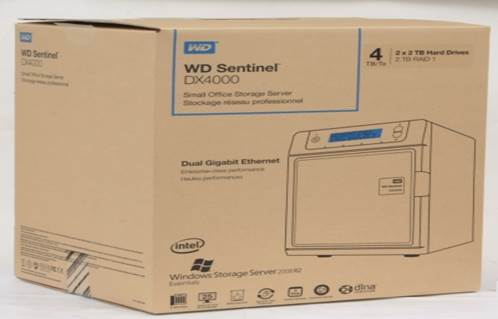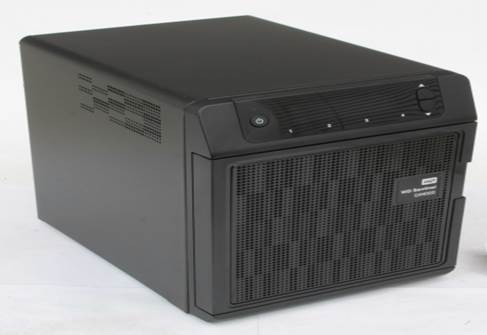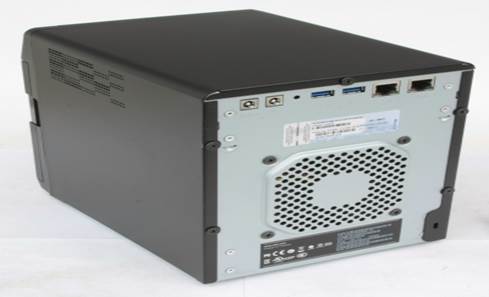Today we will discuss the new NAS storage
system from Western Digital based on Intel 1.8 GHz Atom dual-core processor and
featuring two internal hard disks. It is also reinforced by Windows Storage Server
2008 R2 Essentials and this product is also directed to the target market for
the SMBs with 25 client devices or less.
Western Digital is one of the few first and
leading HDD manufacturers remained after a mass of mergers. However, this
company also offers other sorts of products, including media players and
storage devices coming with network, this product is considered to be the main
business activities of this company. It needs a large HDD for storage of
multimedia files whereas NAS storage devices cannot do this without HDDs.
The products that a company does not
specialize in manufacturing often seem quite meager if it is considered in
terms of features and capabilities of the products. But even lacking the
features targeted to the users, at least they still can be expected to be on
sale at an attractive price level.
The Sentinel DX4000 is currently the unique
NAS storage device in the company’s Small Business Storage category. It was
initiated as a NAS storage device that is easy to set up and manage with
specific data protection features, secure remote access, high performance and
compatibility with different operating systems.
The Sentinel DX4000 comes with various HDD
configurations ranging in capacity from 4 to 16 gigabytes. We take the low-level
version for our tests. It is based on the x 86 platforms with an Intel Atom
processor and Microsoft Windows Storage Server Essentials 2008 R2. It comes
with a 3-year warranty. Additionally, the manufacturer provides paid technical
support and WD Guardian services whereas the warranty period can be extended to
5 years.
The mentioned operating systems are
referred to the low-level version in a series of operating systems for NAS
storage devices from Microsoft. It is also reserved for the SOHO businesses with
the number of other devices up to 25.
Package and accessories
The Sentinel DX4000 is packaged in a large
box with the size of 34 x 29 x40 cm but its inside is filled up with the air
and the rubber pads. The manufacturers have been concerned about the issue that
how the devices are sent to consumers without occurring any problems.

The
product box
The supplied accessories include an
external 120W power adapter with many cords for various regions, an Ethernet
cable, a thick instruction book and a leaflet with technical support warranty
information.

Accessories
Frankly speaking, an external power adapter
is not a good solution for NAS storage devices with 4 hard disks, but it's
easier to replace in the event of incident and better when considering the internal
temperature of the case. This power adapter is manufactured by FSP and its main
device connected to it is for the laptops rather than the desktop computers.
Such cables are not popular, so you should try not to lose any of them. The fan
of NAS storage device will pop up when you connect the power adapter regardless
of how is the operating status of the NAS storage device. The supplied
accessories do not include any discs or software at all. All are already
written on the hard disks.
The exterior design
The Sentinel DX4000 looks very nice. Its
black case is designed in such a way that it does not look bulky although its
size can be compared to other 4-disk SOHO NAS storage devices: 16 x 22.5 x 20.5
centimeters. At the top of the front cover, we can see a Power button, the
operating status of the system and the HDD activity indicators, and a 2-line
dot-matrix display with two buttons.
You can use these buttons to select the
information you want to see on the screen (name and address of the network
connected NAS storage devices, the number of the HDDs, or the available
capacity).

The
device’s case
The door of the HDD slots has got a
metallic grid located in the center so that the outside air can get into the
case. The vent grid with coating looks very shiny. There are also small vents
on the sides of the metallic case.

The
rear of the device
On the back of the case has two power
connectors, Ethernet ports and USB 3.0 ports; a Reset button is hidden inside,
the grid of a 90mm fan for ventilation, and a Kengsinton slot. All the
connectors are located on the top of the shield, so they are easily accessible,
but the cables do not look neat. The two power connectors are believed to make
the NAS storage device look solid.
The case is tenable because of the legs
with rubber soles.

The
image of the product interior
The Sentinel DX4000 does not offer any
conventional means to disassemble the case. You do not need any tools to
install the HDDs into the NAS storage device.
The sturdy metallic frame of the NAS storage
devices is riveted in most locations, so it is very difficult to replace or
clean the cooling fan inside. There is quite a small PCB on top of the case. It
comes with an Intel Atom D525 processor and an ICH9 chipset covered with
pyramid-shaped heat sinks. The hardware platform like this existed 2 years ago.
The system memory consists of two single 2GB DDR3 modules from Samsung attached
in a SO-DIMM slot.

The
image of the product interior
A connector plate is used to connect the
HDDs together, which is a more certainly reliable solution than using cables.
The hard disk controllers are also integrated into the chipset. USB 2.0 is not
used in this NAS storage device, but it has got an additional NEC controller
supporting two USB 3.0 ports. The Ethernet controllers are based on the Intel’s
82574L chips. There is a 3-pin fan connector with the fan system.
There are plenty of unlabeled pads there,
but we do not know whether there is a video output port in these locations.
Meanwhile the high-end NAS storage devices
that come most recently from other brands offer VGA and HDMI ports, the
Sentinel DX4000 is different. The lack of the video output port is probably due
to the requirements of the Intel and Microsoft that require the use of their
chips and software.
The hardware configuration can be compared
to the modern x86 NAS storage devices except for the lack of eSATA (the chipset
is probably to provide two or more ports) and video output port. This absence
makes it almost impossible to run some other operating systems on the Sentinel
DX4000.